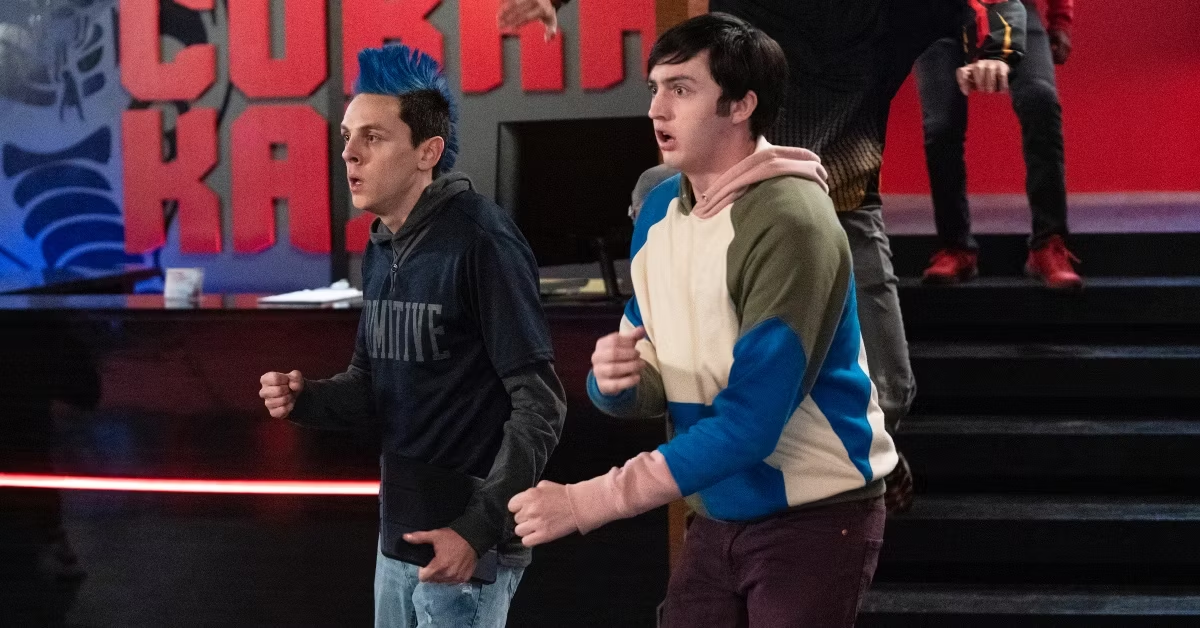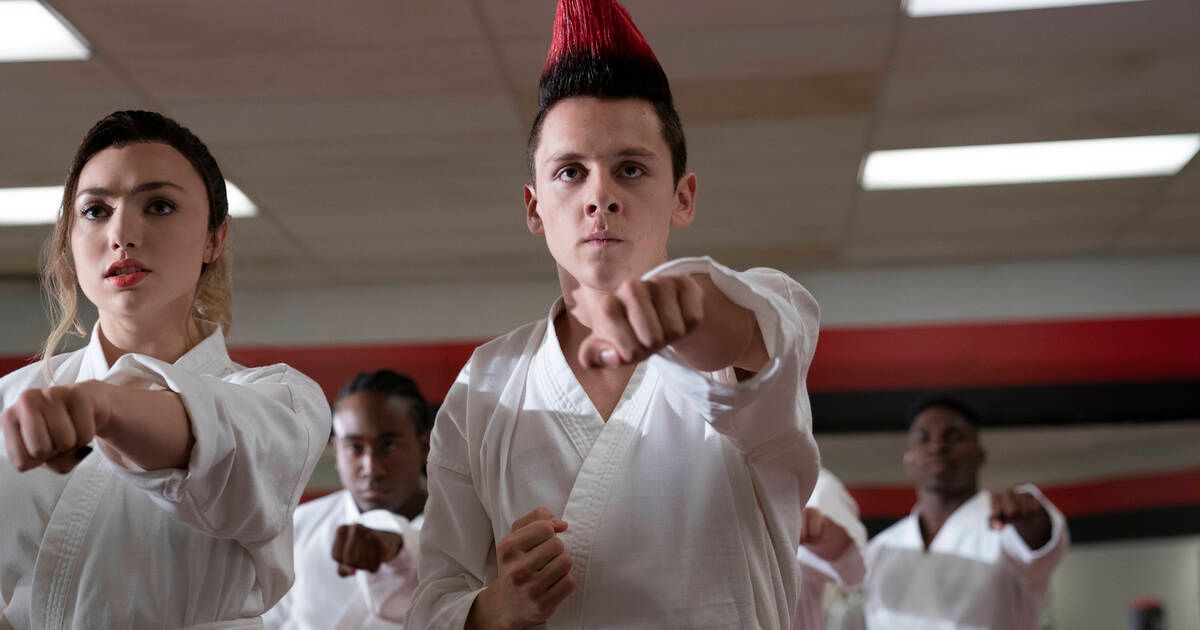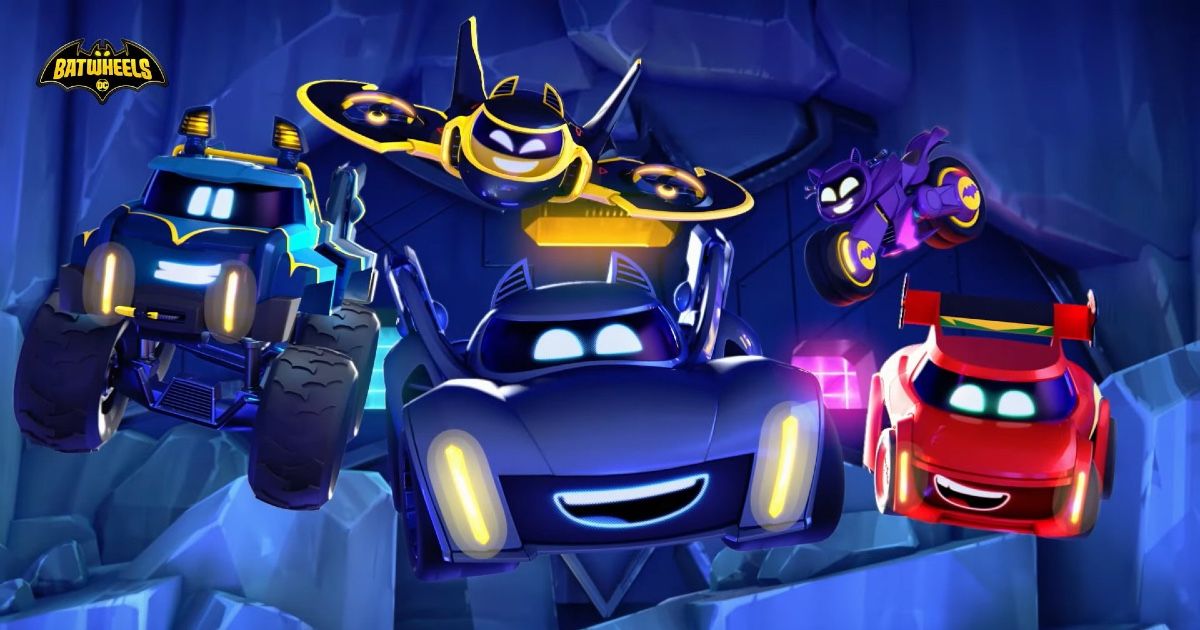Best known as the fan-favorite character Eli ‘Hawk’ Moskowitz in the six-time Emmy-nominated Netflix series Cobra Kai and as Tinkle Town, a.k.a. a young Jeff Winger, on Community, Jacob Bertrand, 21, is about to take on his next challenge. He is voicing the iconic Bam the Batmobile in the new DC preschool animated series Batwheels, which debuted on Batman Day, September 17, with the rest of the season beginning to air on October 27, 2022.
MovieWeb caught up with Bertrand a few weeks after Cobra Kai‘s fifth season debuted on Netflix and before the highly anticipated second episode of Batwheels. Although the actor had just flown into Vancouver to visit a “fancy spa” in the mountains with his girlfriend, he took a moment to discuss “Hawk 3.21” in Season 5, the experience of filming the finale fight, and what it was like to do the voice recording for Batwheels with his Cobra Kai co-star and roommate Xolo Maridueña.
Cobra Kai Season 5 and ‘Hawk 3.21’
MW: Eli goes back to calling himself ‘Hawk’ in Season 5. What does the back and forth of the name symbolize for the character?
Jacob Bertrand: The creators wanted to bring Hawk back in Season 5 after everything he went through in Season 4: getting his head buzzed, overcoming everything [after burning bridges in Season 3], and winning the tournament. In talking with the writers, my character was [meant to be] comedic relief at first. Although Hawk has layers to him, he only started becoming more of a serious character with a dark past and demons that he had to work through [over the last two seasons]. Now he’s at the point where he doesn’t need a Mohawk anymore, but it’s who he is, and he brings it back. He’s like Hawk 3.21. There have been many versions of him, but now he’s slightly more improved. Bug fixes, you know?
MW: Hawk has such a remarkable journey from season to season. He dealt with bullies who picked on him for being cleft-affected, bullied people himself, and learned a hard lesson before becoming the champion at the end of Season 4. Why is Hawk’s story an important story to tell through film?
Jacob Bertrand: At some point, everyone experiences some level of bullying, whether they’re getting bullied or being the bully, so just telling that story to a wide audience is what’s important. I was bullied as a kid. In Season 2, the scene where Eli’s crying to his mom that he’s never going to be anything and will always suck, I’ve had a very similar conversation with my mom. Getting to portray a theme that I feel like I have lived in my life was surreal. When I meet people, it’s 50/50 how they respond to my character. It’s either, “Oh my gosh, you’re Hawk from Cobra Kai, I hate so much, you’re so awful and mean to everyone,” or it’s, “Oh my gosh, you’re Hawk from Cobra Kai, I got bullied all the time, and you gave me strength to stand up to my bully and realize that I am more than what people say about me.”
I think that the harsh storyline and the arc that he’s been able to go on is important because you get to see both sides: all the damage caused when he is bullied and then all the damage that he causes when he isn’t bullied. And then, it’s all tied into a nice little bow because our writers are amazing, and he comes back to the good side, and everybody feels happy… and I won the tournament? I love winning things.
MW: We should talk about why that Season 5 finale scene’s important too; that’s a significant turning point.
Jacob Bertrand: Yeah, I think my character has had a lot of redemption in terms of beating a bully, and I got a super sick ‘Binary Brothers’ action scene. I love getting to film that stuff with Gianni Decenzo. What I really liked about this Season 5 finale was that it took every single person scratching and clawing their way to defeat Terry Silver, even teaming up with the Unbearable Tory. We had to grit our teeth and get some stuff done. It’s fun getting to fight literally everybody, and every single person on the show was fighting that day.
MW: When practicing fight choreography for a big finale scene, how long does it take?
Jacob Bertrand: Oh, gosh, because that was toward the end of the season, we were insanely rushed for time and didn’t learn much fight choreo beforehand. Instead, much of it was learned on the day of filming, which is not preferred, but we made it work. Usually, we get substantially more time. In Seasons 2 and 3, about two weekends before filming a fight, we’d learn the fight choreo that weekend and then practice it whenever we weren’t filming during the week. However, this season was so crazy and hectic with all the insane stunts we’re doing that we didn’t have as much time. But hey, we pulled through.
MW: What was your experience of filming Cobra Kai‘s fourth and fifth seasons back to back?
Jacob Bertrand: We filmed both Season 4 and 5 in the same year. At the start of production on Season 5, all the kids were still fatigued from filming the tournament because that was also crazy. Tanner and I learned the fight choreo the day before we had to do it. We’d seen little bits and pieces of it about a week prior, but nothing substantial. On the day before, they taught us the fight and how we’re going to do it. Then, while we filmed our fight, Peyton and Mary learned their huge fight. Because they had to be on set to give reactions and stuff, they learned their fight choreography for the following day in between takes.
Every single day you were fighting, whether it was doing a little vignette fight on the side mats, or watching someone else fight, or helping people train. Like I helped people train and learn their fights a bunch because we have like 10 or 15 stunt performers there, and we’re all just working together trying to make this thing come together. And yeah, that was fun. It felt like… I don’t know what to liken that to, there’s really nothing like it.
MW: How many stunt performers are usually on set for a show like Cobra Kai?
Jacob Bertrand: Yeah, Cobra Kai is another level when it comes to stunts, and it does get pretty crazy. But you know, Don Lee and Ken Barefield, who are our stunt guys this year, they knocked it out of park. They make it a lot easier for us. We have a core group of seven to eight people that are always there to help train us, and then they’ll bring in people every once in a while. For a show like Cobra Kai, when we do fights, you need a safety guy there because if there’s a big fall, he’s got to work the mats, and then you have like three guys on a rope, and then you need the stunt coordinator and multiple stunt doubles.
Hawk, Smile Train Ambassador
MW: I saw on Instagram that you recently went to Mexico City to see the work Smile Train does with the cleft-affected community. What was that experience like for you?
Jacob Bertrand: Smile Train reached out to my agent and me over the pandemic – there’s not much cleft-affected representation in media – and said they would love to partner with me as an ambassador for their program. I was stoked about the opportunity to learn more about the cleft community and what it means to be cleft-affected.
There are a lot of great organizations doing great work in the cleft community and for kids everywhere, but Smile Train is different. They get doctors to go into communities that might not have access to resources and provide them. When I went to Mexico City, I met many of the pioneers in cleft surgery and learned about what they’re doing in terms of the full-service care they provide for people of all ages. They offer comprehensive care (meal plans, speech therapy, etc.) for months after surgery. I even saw that there is a karate studio that offers karate classes for the kids, and it was cute to see the kids do their katas.
Smile Train also works on mental health because what many people don’t realize is that it’s usually more than one surgery. When you are cleft-affected, sometimes it’s just your lip or sometimes your palate, so it varies case by case and some people need to have multiple surgeries, which has an effect on these little kids and their parents. And Smile Train is just so good at educating everyone in the family about what’s going to happen and the steps that need to be taken, and they’re there with them throughout the whole thing. The people at Smile Train are genuinely caring, and I’m happy that I get to be a small part of what they do.
MW: How did the experience help you with playing a cleft-affected character? How has your Cobra Kai character impacted people in the community?
Jacob Bertrand: [The experience with Smile Train] is something that’s helped me with the character. In talking to them, it’s often not one surgery but multiple surgeries over multiple years to get to where I am. Kids will still make fun of you after years of surgeries, therapy, and work. And, the toll that would take on someone. I don’t know what the experience is like, but I’ve gotten to talk to a lot of cleft-affected ambassadors who are very open and honest about sharing their stories of what it was like living and being bullied for something that is entirely out of your control.
I’ve been to a couple of comic cons and met people just walking around on the street, and I’ve met a couple of people who are cleft-affected. They’re like, “Hey, I have cleft, and I’ve never seen anyone on TV before who has cleft, and I think you’re badass, and I’ve started karate.” I definitely meet a lot of kids who are like, “I was bullied at school, and I’m in karate now and feel great. I stood up to my bully. I told the teachers. Now, everything’s good.” It is cool to hear their stories and to know that this random karate show that I got the opportunity to be on is doing more for the world than just existing on Netflix.
MW: You’ve mentioned in the past that you are also an ambassador for Gobi Can you tell MovieWeb what Gobi is and how you got involved?
Jacob Bertrand: During the pandemic, my agents asked me if there were any charities that I wanted to work with, and I said, “Hey, I don’t know if this exists, but if there is a teenage NA-type program out there, I would love to talk with them,” and that ended up being Gobi because they reached out soon afterward. So it’s a bit of fate. I don’t have personal experience with drug abuse, but I know many people who do, and it’s affected my life, so to be an ambassador for an organization that cares deeply about that is something that I am passionate about.
Gobi is an awesome program that has a very niche role in the world right now. Gobi is a drug intervention program for teens that aims to open a line of dialogue between parents and kids about drug experimentation and abuse because a lot of those experiences comes with isolation, and not really communicating about it. The program is good at starting the dialogue between parents and kids, and is the only program filling the spot that it is. Studies show that having an open line of communication with your parents is important, especially regarding stuff like that.
Bam the Batmobile on Batwheels
MW: In Batwheels, you voice Bam, the Batmobile. What is it like to voice such an iconic character/piece of crime-fighting equipment?
Jacob Bertrand: I was really into superheroes as a little kid, and my brother was a big Batman kid, so I keep thinking about what kids will think when they watch it. I love being Batman’s right-hand man, besides Robin. I have a blast working on the show. The show itself is definitely written for kids and geared toward that age range, but it’s hilarious and there’s stuff written in there that I just die at. I think kids will enjoy watching, but it’s also not mind-numbing if you’re sitting there as a parent or older sibling.
Batwheels is enjoyable to watch as a comic book fan too. We’re getting to see different spots of Gotham that haven’t been shown before… I don’t know how much to give away, but every character has their own individual car. It’s cool to see them expanding on the DC Universe.
MW: When you are developing Bam for Batwheels, DC’s first preschool animated series, are there unique considerations because of the age of the target audience?
Jacob Bertrand: You can’t say “shit” ever. [Laughs.] The biggest thing is energy level because you’re a little more amped than you would normally be, but it works for what this show is: it’s a crime-fighting show, and I play the Batmobile.
MW: There is an amazing voice cast working on Batwheels. Have you been able to record together? If so, what was that experience like? What is it like working with Xolo Maridueña on a different project?
Jacob Bertrand: Yeah, it’s fun. Part of the first season of Batwheels, we recorded in my closet because it was during COVID, and we couldn’t get into a recording studio. They sent me a bunch of equipment first, and then Xolo booked one of the roles and had to start recording it in my closet. So my memory of getting to do voiceover with Xolo is huddling in my closet with him, which barely fits the two of us and all the equipment, and me showing him what to do on my computer, how to turn on the little scarlet box, and everything.
We’re allowed to go in studios, but we’re still not allowed to record with multiple people in the booth. I haven’t got to record with anyone else yet, but there are a ton of cool people on the show. I would love to film with Ethan Hawke — that’d be sick. He is Batman himself, which is awesome. Hopefully, there’s a Season 2 of Batwheels, and we’ll get to go into the booth together.
Stay connected with us on social media platform for instant update click here to join our Twitter, & Facebook
We are now on Telegram. Click here to join our channel (@TechiUpdate) and stay updated with the latest Technology headlines.
For all the latest Education News Click Here



